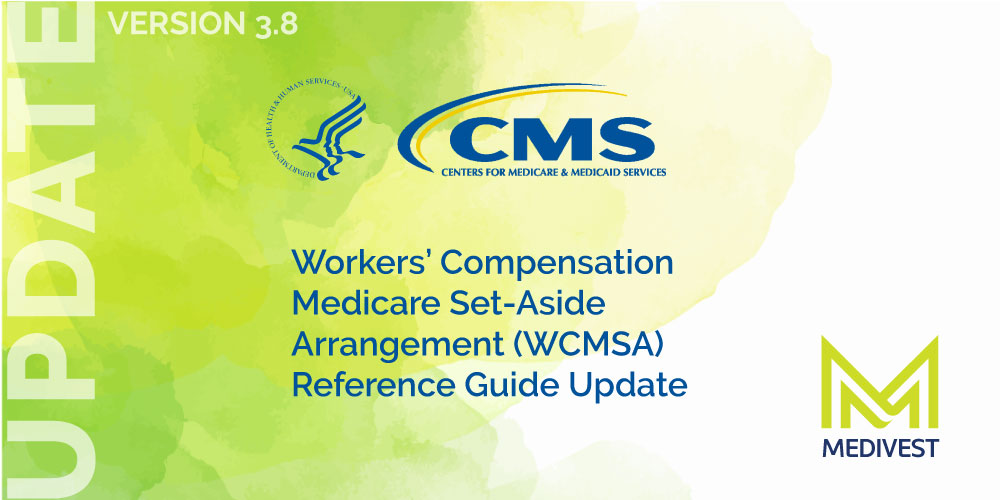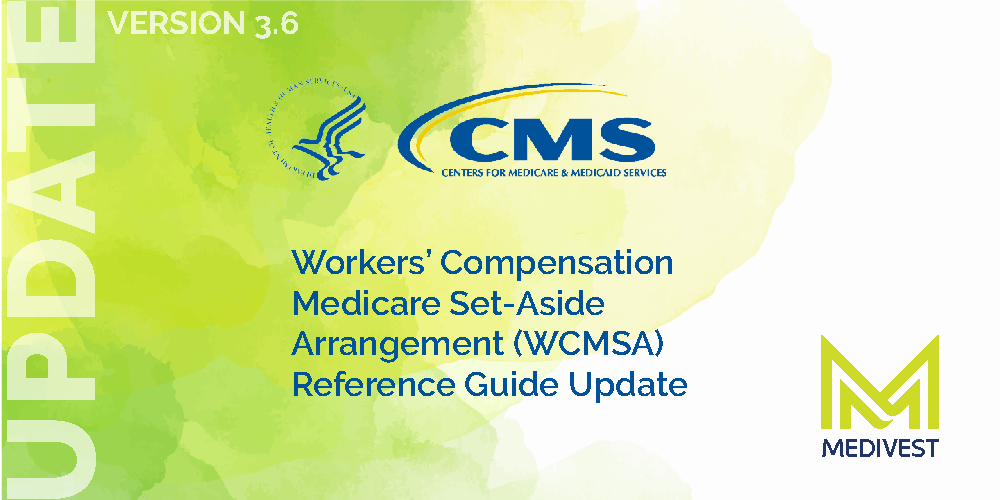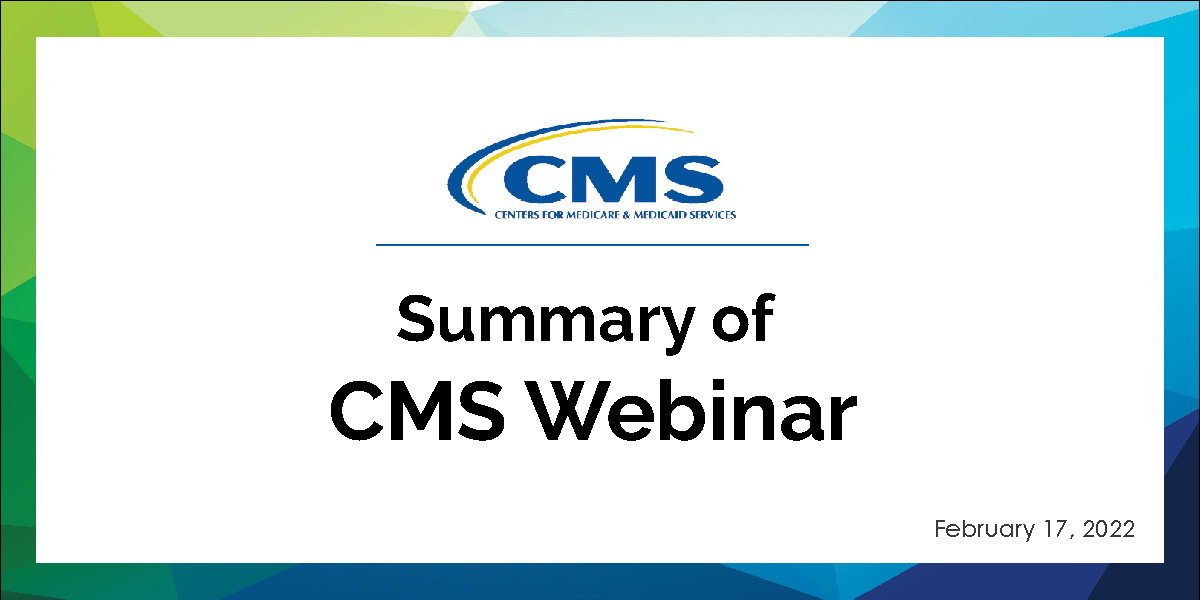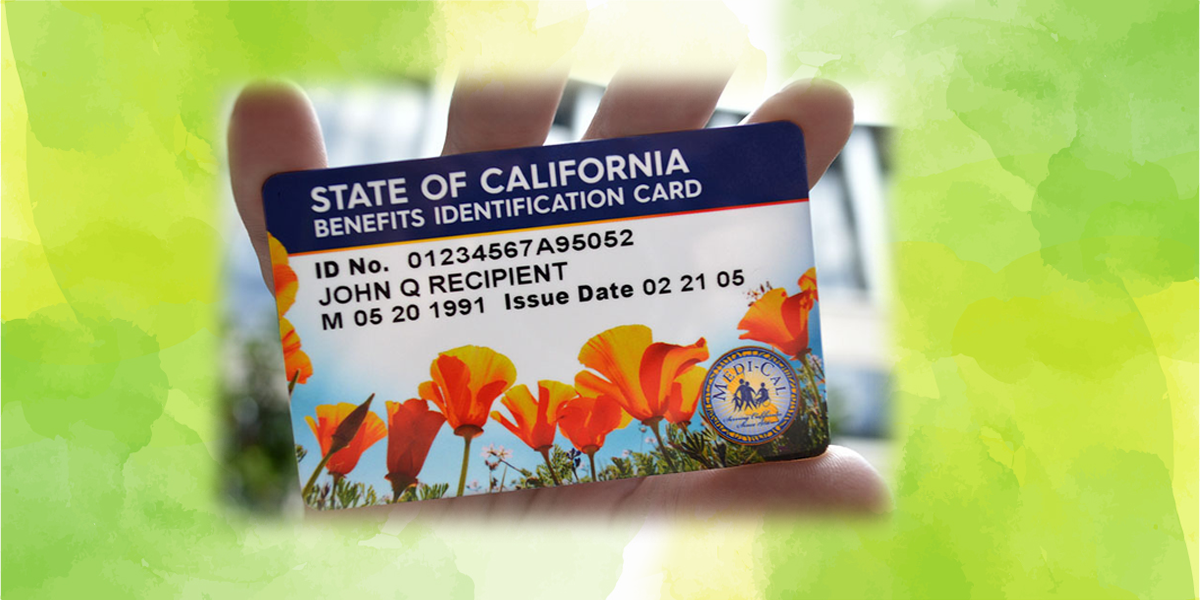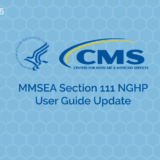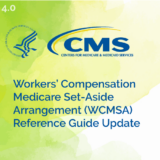Kids' Chance of North Carolina provides educational scholarships to the children of North Carolina workers who have been catastrophically or fatally injured in work-related accidents.
CLASSIC LIST
The California Applicant Attorneys' Association's (CAAA) 2023 Winter Convention is one of California's premier workers' compensation conventions.
The Centers for Medicare & Medicaid Services (CMS) released a revised Workers’ Compensation Medicare Set-Aside Arrangement (WCMSA) Reference Guide (“Reference Guide”) Version 3.8 on November 14, 2022. This Reference Guide replaces Version 3.7 which was released on June 6, 2022. There are a few notable changes when comparing the two Reference Guides.
CMS’s Version 3.8 Reference Guide, Section 1.1 includes the following changes:
Changes in This Version of the Guide Version 3.8 of this guide includes the following changes: Clarification has been provided regarding re-review requests when errors exist in the submission documentation, as well as re-review limitations (Sections 16.1 and 16.2). Note: These re-review changes are only available for approvals from September 1, 2022 forward.
To download the new WCMSA Reference Guide v3.8 Click Here.
For your convenience, we have included the entirety of Section 16.1 and 16.2, so you will have the most up to date information regarding the process of re-review:
16.1 Re-Review
When CMS does not believe that a proposed set-aside adequately protects Medicare’s interests, and thus makes a determination of a different amount than originally proposed, there is no formal appeals process. However, there are several other options available. First, the claimant may provide the WCRC with additional documentation in order to justify the original proposal amount. If the additional information does not convince the WCRC to change the originally submitted WCMSA amount and the parties proceed to settle the case despite the lack of change, then Medicare will not recognize the settlement. Medicare will exclude its payments for the medical expenses related to the injury or illness until WC settlement funds expended for services otherwise reimbursable by Medicare use up the entire settlement. Thereafter, when Medicare denies a particular beneficiary’s claim, the beneficiary may appeal that particular claim denial through Medicare’s regular administrative appeals process. Information on applicable appeal rights is provided at the time of each claim denial as part of the explanation of benefits.

A request for re-review may be submitted based one of the following:
-
Mathematical Error: Where the appropriately authorized submitter or claimant disagrees with CMS’ decision because CMS’ determination contains obvious mistakes (e.g., a mathematical error or failure to recognize medical records already submitted showing a surgery, priced by CMS, that has already occurred), or
-
Missing Documentation: Where the submitter or claimant disagrees with CMS’ decision because the submitter has additional evidence, not previously considered by CMS, which was dated prior to the submission date of the original proposal and which warrants a change in CMS’ determination.
-
-
Disagreement surrounding the inclusion or exclusion of specific treatments or medications does not meet the definition of a mathematical error.
-
-
-
Re-Review requests based upon failure to properly review already submitted records must include only the specific documentation referenced as a basis for the request.
-
Should no change be made upon response to a re-review request (i.e., no error was identified), additional requests to re-review the same error will not be entertained.
-
-
Submission Error: Where an error exists in the documentation provided for a submission that leads to a change in pricing of no less than $2500.00, a re-review request may be made by submitting updated documents free of errors that caused the original review outcome. Amended documents must come from the originators with appropriate notation to identify that the error was corrected, along with the date of correction and no less than hand-written “wet” signature of the correcting individual. Note: This submission option is only available for approvals from September 1, 2022 forward.
-
-
Examples include, but may not be limited to; medical records with incorrect patient identifying information or rated ages where the rated-age assessor provided incorrect information in the rated-age document.
-
16.2 Re-Review Limitations
Note: The following re-review limitations are only available for approvals from September 1, 2022 forward.
Re-review shall be limited to no more than one request by type.
Disagreement surrounding the inclusion or exclusion of specific treatments or medications does not meet the definition of a mathematical error.
Re-Review requests based upon failure to properly review already submitted records must include only the specific documentation referenced as a basis for the request.
Medivest will continue to monitor changes occurring at CMS and will keep its readers up to date when such changes are announced. For questions, feel free to reach out to the Medivest representative in your area by clicking here or call us direct at 877.725.2467.
Medivest will be exhibiting at the Arizona Self-Insurers Association ("ASIA") 2022 Annual Conference. This year's theme will be "Our Responsibilities in the Workers' Compensation Arena: A Caring Approach."
Medivest will be joining the Ohio Association for Justice from November 2 - 4 for its annual Winter Convention. This year's Winter Convention kicks off the OAJ Advocate's Academy, a four-event sequence specifically designed as a training ground to accelerate the performance of newer plaintiffs' attorneys.
The 2022 NCPRIMA Educational Conference attracts public entity Risk Managers, Safety Officers, HR Personnel and others interested in risk management. There is something for everyone.
WCI sponsors the annual Workers’ Compensation Educational Conference and brings together workers’ compensation professionals from across the country. It is the nation’s largest work comp conference and the programming, networking, exhibit hall, and entertainment cannot be matched.
The Centers for Medicare & Medicaid Services (CMS) released a revised Workers’ Compensation Medicare Set-Aside Arrangement (WCMSA) Reference Guide (“Reference Guide”) Version 3.6 on March 15, 2022. This Reference Guide replaces Version 3.5 on January 10, 2022. There are a few notable changes when comparing the two Reference Guides. The blue highlights below indicate the updated changes provided in Reference Guide Version 3.6.
To download the new WCMSA Reference Guide v3.6 click here.
Version 3.6 of this guide includes the following changes:
Clarification has been provided regarding the use of non-CMS-approved products to address future medical care (Section 4.3), as well as documentation and re-review tips (Sections 9.4.1.1, 10.2, and 16.1).
4.3 The Use of Non-CMS-Approved Products to Address Future Medical Care – Additions and Replacements
A number of industry products exist for the purpose of complying with the Medicare Secondary Payer regulations without participation in the voluntary WCMSA review process set forth in this reference guide. Although not inclusive of all products covered under this section, these products are most commonly termed “evidence-based” or “non-submit.”
42 C.F.R. 411.46 specifically allows CMS to deny payment for treatment of work-related conditions if a settlement does not adequately protect the Medicare program’s interest. Unless a proposed amount is submitted, reviewed, and approved using the process described in this reference guide prior to settlement, CMS cannot be certain that the Medicare program’s interests are adequately protected. As such, CMS treats the use of non-CMS-approved products as a potential attempt to shift financial burden by improperly giving reasonable recognition to both medical expenses and income replacement.
As a matter of policy and practice, CMS may at its sole discretion deny payment for medical services related to the WC injuries or illness, requiring attestation of appropriate exhaustion equal to the total settlement as defined in Section 10.5.3 of this reference guide, less procurement costs and paid conditional payments, before CMS will resume primary payment obligation for settled injuries or illnesses, unless it is shown, at the time of exhaustion of the MSA funds, that both the initial funding of the MSA was sufficient, and utilization of MSA funds was appropriate. This will result in the claimant needing to demonstrate complete exhaustion of the net settlement amount, rather than a CMS-approved WCMSA amount.
Notes: This official policy shall apply to all notifications of settlement that include the use of a non-CMS-approved product received on, or after, January 11, 2022; however, flags in the Common Working File for notifications received prior to that date will be set to ensure Medicare does not make payment during the spend-down period.
CMS does not intend for this policy to affect any settlement that would not otherwise meet review thresholds. This comment does not relieve the settling parties of an obligation to consider Medicare’s interests as part of the settlement; however, CMS does not expect notification or submission where thresholds are not met.
9.4.1.1 Most Frequent Reasons for Development Requests – Expanded Explanations
The five most frequent reasons for development requests by the WCRC:
-
-
Insufficient or out-of-date medical records. Medical records are required documents for all submissions, including situations where the parties are in dispute.
-
Insufficient payment histories, usually because the records do not provide a breakdown for medical, indemnity or expenses categories. Payment histories are required documents for all submissions, including situations where the parties are in dispute, and must include breakdowns for payment categories along with identification of any category codes.
-
Failure to address draft or final settlement agreements and court rulings in the cover letter or elsewhere in the submission. Draft or final settlement agreements and court rulings are required documents for all submissions, if they exist. For settlements where conditional payments are made as an element of the agreement, the WCRC will not accept a letter indicating that draft or final settlements do not exist.
-
Documents that are referenced in the file are not provided—this usually occurs with court rulings or settlement documents.
-
References to state statutes or regulations without providing sufficient documentation (i.e., to which payments the statutes/regulations apply or a copy of the statute or regulation, or notice of which statutes or regulations apply to which payments).
-
10.2 Section 10 – Consent to Release Note – Additions
The Consent to Release note is the claimant’s signed authorization for CMS, its agents and/or contractors to discuss his or her case/medical condition with the parties identified on the authorization in regard to the WC settlement that includes a WCMSA. When you submit your WCMSA, you are required to include the signed consent, plus any applicable court papers if the consent is signed by someone other than the claimant (for example, a guardian, power of attorney, etc.). Do not include unsigned consents or consents to obtain medical records from a provider.
All consent-to-release notes must include language indicating that the beneficiary reviewed the submission package and understands the WCMSA intent, submission process, and associated administration. This section of the consent form must include at least the beneficiary’s initials to indicate their validation.
Consent to Release documents must be signed (by hand or electronically) with the full name of either the claimant, matching the claimant’s legal name, or by the claimant’s authorized representative, if documentation establishing the relationship is also provided. It must be a full signature, not just initials. For electronic standards, only the use of an E-SIGN Act-compliant e-signature or initials are considered valid.
If there is a change in submitter, please see Section 19.4 for more information.
16.1 Re-Review – Additions
A request for re-review may be submitted based one of the following:
-
-
Mathematical Error: Where the appropriately authorized submitter or claimant disagrees with CMS’ decision because CMS’ determination contains obvious mistakes (e.g., a mathematical error or failure to recognize medical records already submitted showing a surgery, priced by CMS, that has already occurred), or
-
Missing Documentation: Where the submitter or claimant disagrees with CMS’ decision because the submitter has additional evidence, not previously considered by CMS, which was dated prior to the submission date of the original proposal and which warrants a change in CMS’ determination.
-
-
-
-
Disagreement surrounding the inclusion or exclusion of specific treatments or medications does not meet the definition of a mathematical error.
-
Re-Review requests based upon failure to properly review already submitted records must include only the specific documentation referenced as a basis for the request.
-
Should no change be made upon response to a re-review request (i.e. no error was identified), additional requests to re-review the same error will not be entertained.”
-
-
Analysis
The removal of the reference to indemnification in the first part of Section 4.3 seems to have been CMS’s way of expressing its realization that the intent of settling parties in using non-submit WCMSAs is to protect Medicare’s interests as opposed to being designed merely to protect against MSP exposure via a shift of risk from one company’s errors and omissions coverage to another’s.
[Old Section 4.3 phrase]: “with the intent of indemnifying insurance carriers and CMS beneficiaries against future recovery for conditional payments made by CMS for settled injuries.” [New Section 4.3 phrase]: “for the purpose of complying with the Medicare Secondary Payer regulations without participation in the voluntary WCMSA review process set forth in this reference guide.”
Does the additional language about expectations for WC settlements that do not meet workload review threshold in Section 4.3 now really clarify what the plan for future care should be when the two examples in Section 8.1, titled Review Thresholds still describe recoveries by CMS for payments and care related to the injury up to the total value of the settlement if the settling parties fail to consider Medicare’s future interests/fail to establish “some plan for future care” ? The referenced examples are listed below for ease of access:
Example 1: A recent retiree aged 67 and eligible for Medicare benefits under Parts A, B, and D files a WC claim against their former employer for the back injury sustained shortly before retirement that requires future medical care. The claim is offered settlement for a total of $17,000.00. However, this retiree will require the use of an anti-inflammatory drug for the balance of their life. The settling parties must consider CMS’ future interests even though the case would not be eligible for review. Failure to do so could leave settling parties subject to future recoveries for payments related to the injury up to the total value of the settlement ($17,000.00).
Example 2: A 47 year old steelworker breaks their ankle in such a manner that leaves the individual permanently disabled. As a result, the worker should become eligible for Medicare benefits in the next 30 months based upon eligibility for Social Security Disability benefits. The steelworker is offered a total settlement of $225,000.00, inclusive of future care. Again, there is a likely need for no less than pain management for this future beneficiary. The case would be ineligible for review under the non-CMS-beneficiary standard requiring a case total settlement to be greater than $250,000.00 for review. Not establishing some plan for future care places settling parties at risk for recovery from care related to the WC injury up to the full value of the settlement.
Stay Up To Date
Count on Medivest to help you navigate your risk tolerance in light of the new CMS WCMSA Reference Guide language to see if we can’t find the right balance to reasonably protect Medicare’s interests in your settlement. Medivest will continue to monitor changes in the guidance and regulations published by CMS and will keep its readers up to date when such changes are announced/made. For questions regarding these updates, please reach out to a Medivest representative in your area by clicking here or by calling us direct at 877.725.2467.
On February 17, Centers for Medicare & Medicaid Services (CMS) held a webinar concerning Workers’ Compensation Medicare Set-Aside (WCMSA) and updates from Section 4.3 of the New WCMSA Reference Guide. John Jenkins, Health Insurance Specialist for CMS, and Contracting Officer’s Representative (COR) hosted the presentation and addressed a variety of questions on the topics.
Note: CMS opened the call with a disclaimer indicating that if there are any discrepancies between what is said on the call and what is written in the Workers’ Compensation Medicare Set-Aside Arrangement Reference Guide (WCMSA Reference Guide or Reference Guide), what is written in the Reference Guide will control.
Treatments
When the Injured Worker (IW), due to comorbidities, is not medically cleared to have a recommended surgery CMS still wants the surgery to be included in the Medicare Set-Aside (MSA). It cannot assume the IW will not be able to meet the medical clearance requirement in the future.
No Treatment Necessary
-
According to Jenkins, if there is a reasonable expectation that there is or will be future treatment for an ongoing medical condition, the Workers’ Compensation Review Contractor (WCRC) has a reasonable expectation that future care should be projected. If a specialist opines that care has concluded, the WCRC feels that it is extremely rare that an individual has only one provider, and there may be other providers including a primary treating physician that would recommend future care. If the individual truly does not need future care beyond a settlement and this is documented, the file should not rise to the level that requires submission. *
Medivest commentary: While not specifically mentioned on the call, Section 4.2 of the Reference Guide lists three requirements that should be met for this no future treatment necessary to take effect as an indication that Medicare’s future interests in a settlement are protected:
“4.2 Indications That Medicare’s Interests are Protected
Submitting a WCMSA proposed amount for review is never required. But WC claimants must always protect Medicare’s interests. A WCMSA is not necessary under the following conditions because when all three are true, they indicate that Medicare’s interests are already protected:
-
-
-
-
The facts of the case demonstrate that the injured individual is only being compensated for past medical expenses (i.e., for services furnished prior to the settlement);
-
There is no evidence that the individual is attempting to maximize the other aspects of the settlement (e.g., the lost wages and disability portions of the settlement) to Medicare’s detriment; and
-
The individual’s treating physicians conclude (in writing) that to a reasonable degree of medical certainty the individual will no longer require any Medicare-covered treatments related to the WC injury.”
-
-
-
Denial / State Specific / Hearings on the Merit
-
CMS recognizes there is such a thing as a legal denial. Jenkins emphasized that CMS standards say there must be some written response from a court of competent jurisdiction or associated board with authority under the law, pursuant to a disputed hearing on the merits. CMS will not decide whether a specific medical condition is or is not causally related to the compensated claim or whether it is or is not catastrophic if a statute limits WC benefits after a set time for catastrophic injuries. If you submit an unfunded “Zero MSA” for approval, CMS and its WCRC expects that such legal support will be included as documentation for the same. Any documentation must be signed by the legal authority.
Regarding a Medical Item, Service, or Expense Recommended by the Treating Physician but Denied by an Independent Medical Review (IMR)
-
It depends on whether an alternative treatment plan is provided. In California, the initial IMR denial is only good for a period of one year and does mean that the denial won’t be overturned on appeal. CMS’s position is if a submitter is going to send in a package and has an item, service, or a prescription drug that the IMR states does not meet the requirements of appropriate treatment, then the item, service, or expense will not be considered unwarranted by the WCRC unless an alternative treatment is provided. If there is no alternative item, service, or expense provided by the treating physician after any such denial, CMS will default to what the treating physician originally recommended.
Medivest commentary: This discussion addressed several areas discussed in the Reference Guide under Section 9.4.5 Medical Review Guidelines specifically listed in its subsection titled State-Specific Statutes, with the main points being listed below for additional clarification:
“A submitter requesting that CMS review the applicability of a state WC statute must include a copy of the statute with the submission and indicate to which section the topic in the submission the statute applies.
Submitters requesting alteration to pricing based upon state-legislated time limits must be able to show by finding from a court of competent jurisdiction, or appropriate state entity as assigned by law, that the specific WCMSA proposal does not meet the state’s list of exemptions to the legislative mandate. For those states where treatment is varied by some type of state-authorized utilization review board, the submitter shall include the alternative treatment plan showing what treatment has replaced the treatment in question from the beneficiary’s treating physician for those items deemed unnecessary by the utilization review board. Failure to include these items initially will result in pricing at the full life expectancy of the beneficiary or the original value of treatment without regard to the state utilization review board recommendation.
Note: Failure to include the required documentation at the time of original submission will not constitute a reason for the request of a re-review.”
Regarding RX Drugs
-
CMS is open to input from the MSP compliance community regarding improvements that might be made in the future regarding dispensing fees and the lowest-priced accepted national drug code at below average market rate.
Amended Review Process
-
CMS did not answer the question posed regarding approved cases that are over 72 months old and did not settle and whether the original MSA approval should be funded for approved cases.
Regarding Annual Attestation
-
Jenkins says CMS places a flag in their system related to body parts and treatment as a result of the CMS submission. That flag will not be removed from the system until the individual provides the attestation as per CMS guidelines.
Regarding Data Sharing with Part D Prescription Drug Plans (PDPs)
-
CMS is not currently sharing all data with Part D plans because those part D plans have not specifically requested it.
Regarding Non-CMS Approved MSAs
-
CMS indicated it had received a lot of questions regarding non-submit MSAs, so that was the driving force behind the inclusion of Section 4.3 in the recently updated WCMSA Reference Guide.
-
Jenkins indicated that CMS’s position with under-threshold WC settlements is that they never would have seen them. He indicated that CMS will issue additional clarification on how to handle those cases in the future.
Medivest commentary: Presumably to add clarification to Section 8.1 entitled Review Thresholds that already provides the two specific examples listed below to illustrate CMS expectations when a WC settlement does not meet Workload Review Threshold:
“Example 1: A recent retiree aged 67 and eligible for Medicare benefits under Parts A, B, and D files a WC claim against their former employer for the back injury sustained shortly before retirement that requires future medical care. The claim is offered settlement for a total of $17,000.00. However, this retiree will require the use of an anti-inflammatory drug for the balance of their life. The settling parties must consider CMS’ future interests even though the case would not be eligible for review. Failure to do so could leave settling parties subject to future recoveries for payments related to the injury up to the total value of the settlement ($17,000.00).
Example 2: A 47-year-old steelworker breaks their ankle in such a manner that leaves the individual permanently disabled. As a result, the worker should become eligible for Medicare benefits in the next 30 months based upon eligibility for Social Security Disability benefits. The steelworker is offered a total settlement of $225,000.00, inclusive of future care. Again, there is a likely need for no less than pain management for this future beneficiary. The case would be ineligible for review under the non-CMS-beneficiary standard requiring a case total settlement to be greater than $250,000.00 for review. Not establishing some plan for future care places settling parties at risk for recovery from care related to the WC injury up to the full value of the Settlement.”
-
With respect to non-approved products, CMS is still putting a marker in their system indicating there is a MSA. The marker allows CMS to avoid making payment.
Medivest commentary: What was not discussed was how WC settlements compensating for future medicals but not submitted for approval to CMS (such as Evidence-Based Medicine MSAs or other non-submit WCMSAs) that are reported by Responsible Reporting Entities (RREs) for self-insured employers or WC carriers under Section 111 Mandatory Insurance Reporting will also be flagged for medical denials. RREs report the ICD diagnosis codes being compensated in a settlement at the time of their electronic Section 111 submission of data including the total settlement amount. Because an approved WCMSA amount is not listed for non-submitted WCMSAs, the default in the Common Working File (CWF) for the WCMSA amount is the settlement amount. Therefore, it seems highly likely that CMS will become more and more efficient in setting the system flags to deny future payments of medicals that correspond to compensated ICD codes deemed by RREs to be associated with a WC settlement. While the remedy of a denied medical is an appeal, if the goal is to not have an injured worker experience a future Medicare medical denial, CMS seems to suggest that the best way to address this issue would be to submit those WC settlements that meet workload review thresholds.
-
The non-CMS approved products do not allow CMS to put a marker in the system and block payment. Until recently, no one provided CMS with that documentation.
Medivest commentary: This statement seemed to contradict the prior statement. The theory initially described was that only submitted WCMSAs are flagged for medical denials to help ensure that CMS complies with the MSP by not paying for medicals when the items, services, or expenses for those specific ICD codes were compensated by the WC settlement. There was no discussion during this webinar on the interplay between Section 111 data and the data obtained via the WCMSA submission process. We hope that CMS will clarify this issue moving forward.
-
There is the possibility the beneficiary will have to expend some of their funds outside of the MSA in a non-approved product situation – it was stated CMS was allowed to deny medicals up to the entire net settlement (allowing for a deduction for procurement costs to be consistent with existing MSP regulations).
-
CMS does not recognize the use of structured settlements for non-submitted MSA products. The individual must demonstrate they have exhausted the full value. CMS will only consider them as a lump sum settlement. CMS will not make payment until the full MSA amount has been exhausted even if they are notified the funding of the MSA was via structure.
-
The WCMSA does not demonstrate post-settlement compliance. The WCMSA is strictly an agreement between CMS and the CMS beneficiary about what dollar value/time, CMS will return as a primary payor if they can show the funds were used correctly. This is an agreement between CMS and the beneficiary only.
-
CMS will stick to the release date of Jan 11th, 2022, regarding how it handles the use of non-CMS approved products.
-
“If a non-approved product is priced correctly, Medicare is never going to see a bill.”
Medivest commentary: This was possibly the most important statement made by Jenkins. He is admitting the reality that there certainly can be reasonably priced non-submit MSAs that do exactly what they were intended to do. If the non-submit MSA accurately reflects the Medicare beneficiary’s injury related Medicare covered medicals and is exhausted exclusively for those purposes, then clearly Medicare’s interests have been protected because Medicare will not be prematurely (or ever) billed for those medicals.
Medivest will continue to monitor changes occurring at CMS and will keep its readers up to date when such changes are announced. For questions, feel free to reach out to the Medivest representative in your area by clicking here or call us direct at 877.725.2467. For any specific questions regarding MSAs of any type, click here.
On November 16, 2021, the State of California’s Medicaid Agency, the Department of Health Care Services (DHCS or Medi-Cal), issued an All County Welfare Directors Letter (ACWDL or Letter) number 21-26 as a memo to all counties and people who administer various state based benefits, including all Medi-Cal Program Specialists/Liaisons.
The Letter provides clarification on Medicare Set-Aside (MSA) funds, as defined by CMS in the Workers’ Compensation realm. The primary message is that “MSAs, also called Workers’ Compensation Medicare Set-Aside Arrangement Accounts (WCMSA), are not countable as income and property on the basis of their unavailability when determining an individual’s eligibility for Medi-Cal.”
This can be significant for several reasons outlined in the Takeaways section. Traditionally, an injured party that was otherwise eligible for need based benefits would be advised by their attorney to have a 1st Party Special Needs Trust of some type (individual or Pooled Trust – together referred to here as an SNT) established to help assure the eligibility of those benefits at that time or in the future. However, there may be times when the cost of establishing such an SNT might be cost prohibitive compared to the value of the benefits to be protected.
Summary
The Letter describes that because the funds in the MSA account are to be used for their intended purpose, covering the costs of future medical needs [that are injury related and Medicare covered], they should be considered unavailable income and not countable when determining an individual’s eligibility for Non-Modified Adjusted Gross Income (MAGI) programs. However, the Letter indicates that it is important to note that interest or dividends generated by the interest-bearing account should be considered available income for MAGI eligibility determination.
The Letter explains that MSAs had previously been determined to not be countable as property pursuant to a previous All County Welfare Directors letter numbered 90-01 from 1990. “MSA funds are considered unavailable property under ACWDL 90-01 (January 5, 1990), Section 50402 of that letter.”
The Letter also provides guidance to California counties on MSAs regarding:
-
-
MAGI eligibility
-
Non-MAGI eligibility concerning:
-
Property
-
Income
-
-
Tasks that are County responsibilities
-
Tasks that are NOT County responsibilities
-
The full ACWDL 21-26 Letter with additional details and information is available here.
Takeaways
-
This Letter does not discuss settlements that exceed the WCMSA amount. Settlements that exceed the WCMSA amount meaning they exceed the injury related Medicare covered medical items, services, and expenses reasonably expected for the injured party and that are paid outside the WCMSA, might disqualify the injured party from Medi-Cal benefits.
-
The Letter also does not discuss that the injured party’s need based benefits may be jeopardized if the injured party moves to another state without taking steps to address the eligibility of the new state’s Medicaid benefits via the use of an SNT within the required time frame to afford such protection.
-
The information in this Letter may come in handy for certain cases where the cost of a SNT is a prohibitive factor that would affect whether a smaller Workers’ Compensation settlement could proceed.
-
The letter does not make it clear how Medi-Cal would view a liability MSA (LMSA), i.e., an MSA allocation report and arrangement for administration pursuant to the settlement of a liability case.
-
As always, you should consult with an attorney licensed in the state where the settlement occurs (as well as disclose to the injured party to consult with an attorney specializing in the protection of need based benefits for the state where the settlement occurs and in any state they plan to move to ahead of their move) to confirm their rights, their entitlement to any specific benefits, and so that they understand that state need based benefit eligibility varies and other states’ laws likely do not afford this same protection.


